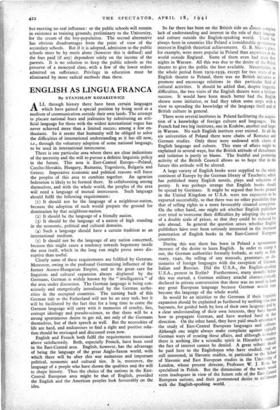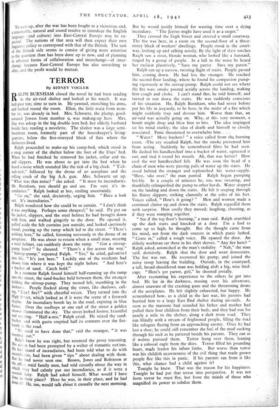ENGLISH AS LINGUA FRANCA
By STANISLAW KOZAKIEWICZ
ALL through history there have been certain languages which have gained a special position by being used as a medium of communication outside their own lands. The attempt to placate national fears and jealousies by substituting an arti- ficial language for those with the widest international vogue has never achieved more than a limited success among a few en- thusiasts. So it seems that humanity will be obliged to solve the difficulties of international understanding as it has till now, i.e., through the voluntary adoption of some national language, to be used in international intercourse.
There is one particular area where there are clear indications of the necessity and the will to pursue a definite linguistic policy in the future. This area is East-Central Europe—Poland, Czecho-Slovakia, Hungary, Rumania, Yugoslavia, Bulgaria and Greece. Imperative economic and political reasons will force the peoples of this area to combine together. An agrarian federation is likely to be formed there. In collaborating among themselves, and with the whole world, the peoples of the area will need a language of mutual intercourse. Such language should fulfil the following requirements: (t) It should not be the language of a neighbour-nation, because the adoption of such would prepare the ground for domination by that neighbour-nation.
(2) It should be the language of a friendly nation.
(3) It should be the language of a nation of high standing in the economic, political and cultural domains.
(4) Such a language should have a certain tradition as an international medium.
(5) It should not be the language of any nation concerned, because this might cause a tendency towards hegemony inside the area itself, which in the long run might prove more dis- ruptive than useful.
Clearly some of these requirements are fulfilled by German. Moreover, owing to the profound Germanising influence of the former Austro-Hungarian Empire, and to the great-care for linguistic and cultural expansion always displayed by the Germans, German is widely known by the " intelligentsia " of the area under discussion. The German language is being con- sciously and energetically introduced by the German autho- rities in the occupied countries. The turning back of this German tide to the Fatherland will not be an easy task, but it will be facilitated by the fact that for a long time to come the German language will carry with it memories of cruelty, lies, corrupt ideology and pseudo-science, so that there will be a strong spontaneous desire to get rid, not only of the Germans themselves, but of their speech as well. But the necessities of life are hard, and endeavours to find a right and positive solu- tion should be envisaged and discussed even now.
English and French both fulfil the requirements mentioned- above satisfactorily. Both, especially French, have been used in the East-Central area. English, however, has the advantage of being the language of the great Anglo-Saxon world, with which there will be after this war numerous and important political, economic and cultural ties. It is, moreover, the language of a people who have shown the qualities and the will to shape history. Thus the choice of the nations in the East- Central European area might be that of English, provided the English and the American peoples look favourably on the idea. and culture outside the English-speaking world. There has always been in countries like Poland a considerable spontaneous interest in English theatrical achievements. G. B. Sha lack of understanding and interest in the role of their language So far there has been on the British side an al.most:osmpplaley: for example, were more popular in Poland than anywhere in the world outside England. Some of them even had their first nights in Warsaw. All this was due to the desire of the Polish theatre to give the public the best available. Nevertheless, in the whole period from 1919-1939, except for two visits of an English theatre to Poland, there was no British initiative to promote and encourage relations in this particular field of cultural activities. It should be added that, despite linguistic difficulties, the two visits of the English theatre were a brilliant success. It would have been much better had the English shown some initiative, or had they taken some steps with a view to spreading the knowledge of the language itself and of British culture in general.
There were several institutes in Poland facilitating the acquisi- tion of a knowledge of foreign culture and languages. The French had two big institutes, one in KrakOw, another and larger in Warsaw. No such English institute ever existed. In all the six universities of Poland there were chairs of Romance and German studies. Only three were endowed with chairs of English language and culture. This state of affairs might be explained in several ways, but the British attitude of detachment and isolation is partly to blame. The fruitful and promising activity of the British Council allows us to hope that in the future this attitude will be altered.
A large variety of English books were supplied to the whole continent of Europe by the German library of Tauchnitz, which has published many English novels, plays and selections of poetry. It was perhaps strange that English books should be spread by Germans. It might be argued that books printed in the United Kingdom or U.S.A. were too expensive to be exported successfully, so that there was no other possibility than that of selling rights to a more favourably situated competitor. On the other hand,. one might ask whether English publishers ever tried to overcome their difficulties by adopting the system of a double scale of prices, so that they could be reduced for sale abroad. In general the question arises whether English publishers have ever been seriously interested in the increased penetration of English books in the East-Central European countries.
During this war there has been in Poland a spontaneous increase of the desire to learn English. In order to stamp it out, the German authorities formally forbade, as early as Feb- ruary, 194o, the selling of any manuals, grammars. or dic- tionaries of foreign languages with the exception of German, Italian and Russian. Did the U.S.A.z the English-speaking U.S.A., protest in Berlin? Furthermore, many month, before this war started, a German military attaché charact,r:stcally declared in private conversation that there was no need to learn any great European language because German would sops become the language of the whole world. In would be an injustice to the Germans if their linguistic expansion should be explained as furthered by nothing else than bayonets, for guided both by love of their own language and by a clear understanding of their own interests, they have known how to propagate German, and have worked hard in that direction. On the other hand, they have paid much attention to the study of East-Central European languages and ,ulnires. Although one might always make complaint against lypicallY German ways of treating•these affairs, and although n -wadaYs there is nothing like a scientific spirit in Himmler's zountr.Y: the fact of interest cannot be denied. A great tribute should be paid here to the Englishmen who have studied. and are .
still interested, in Slavonic studies, in particular to the Schoo? of Slavonic and East European studies in the University -London, whose present director, Professor W. J. R, se, has., specialised in Polish. But the dimensions of the work would seem inadequate in view of the future role of the East-Cenol European nations, and their pronounced desire to co, laborat with the English-speaking world. To sum up, after the war has been fought to a victorious end, a reasonable, natural and sound resolve to introduce the English language (and culture) into East-Central Europe may be ex- pected. The nations of that area will then expect their own . linguistic policy to correspond with that of the British. The task of the British side seems to consist of giving more attention to the question than has been done up to now, and of planning in advance forms of collaboration and interchange—of inter- change because East-Central Europe has also something to offer, and the profit would be mutual.



























 Previous page
Previous page